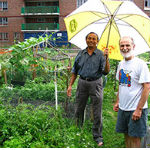Highlights from October’s Toronto Food Policy Council Meeting
Posted: October 16, 2013
Categories: News from Sustain Members / News from Sustain Ontario
On Wednesday, October 9th, the Toronto Food Policy Council (TFPC) meeting was hosted by the Toronto Christian Resources Centre (CRC), at 40 Oak Street in Regent Park. Louise Moody, Executive Director, welcomed council members and the public to the CRC site, which opened in March 2012. The site consists of 87 units of supportive housing above a community activity hub that will include a Community Food Centre, based on The Stop program. Other amenities include the Community Meal Program which serves 100-150 for breakfast and up to 250 people for lunch; shower and laundry facilities; a rooftop garden; and an adult-focused Community Clothing Program.
Topics of interest included an update on the status of the Toronto Youth Food Policy Council’s four working committees, and the TFPC’s much anticipated urban agriculture report (a continuation of Grow TO advocacy), currently scheduled to be presented by City of Toronto staff at to Council on October 23, 2013 at 9:30 am. Additionally, there will now be two city staff from municipal licensing services who will advise the TFPC on regulations and policies regarding street food, including food trucks.
Guest speaker, Janet Horner, Executive Director of the GTA Agricultural Action Committee (GTAAAC), part of the Golden Horseshoe Food and Farming Alliance, discussed their new report, Golden Horseshoe Agri-food Asset Mapping Project, which lays out the importance of food production, food services and food processing value chains to municipalities in the Golden Horseshoe. The collaboration of municipalities and regional economic development and public health departments enabled a comprehensive collection of data which resulted in this mapping project – the first report of its kind in Ontario. The report emphasizes the importance of the Golden Horseshoe’s rural and urban relationships which create a strong regional foodshed. Horner is scheduled to present the asset mapping tool in detail at the TFPC’s December 11th meeting at 2 pm in the North York Civic Centre. Janet Horner is also the Program Committee Chair of the provincial Bring Food Home conference, taking place on November 17th – 19th in Windsor.
Finally, special guest speaker Eleanor Boyle, author of High Steaks: Why and How to Eat Less Meat, discussed her thoughts on why people should choose meat and meat products that are compassionately, respectfully and sustainably-produced. She argues that meat need not be eliminated from the diet, merely consumed moderately and purchased from ecological producers. Boyle emphasized that public education on the negative effects of over-consumption of intensively farmed animals and large-scale slaughter and processing practices on our health, the environment and global food security are central to changing purchasing and consumption patterns, which are key in instigating policy change for the meat industry. Boyle believes we can eat less, but better.
The TFPC, a subcommittee of the Toronto Board of Health, advises the City of Toronto on food policy issues. Many of their meetings are open to the public.

